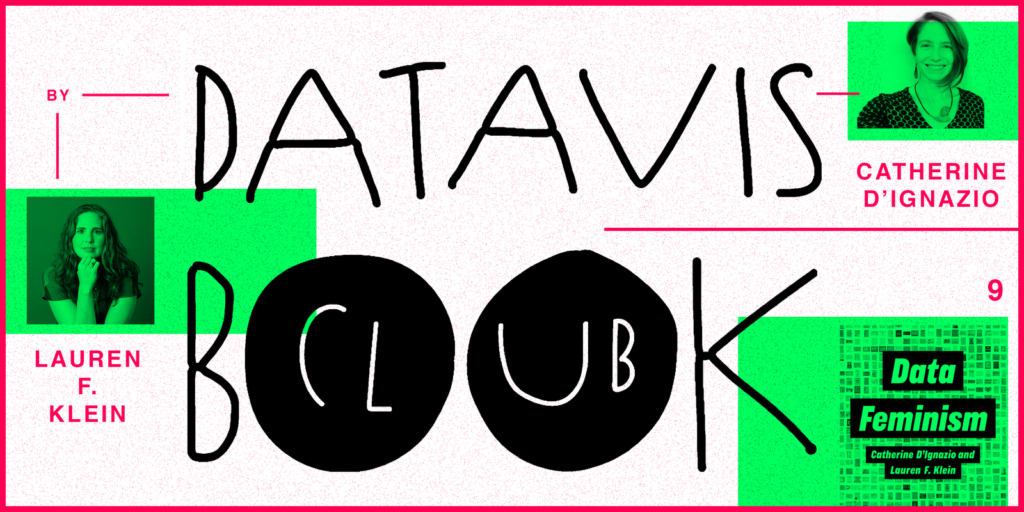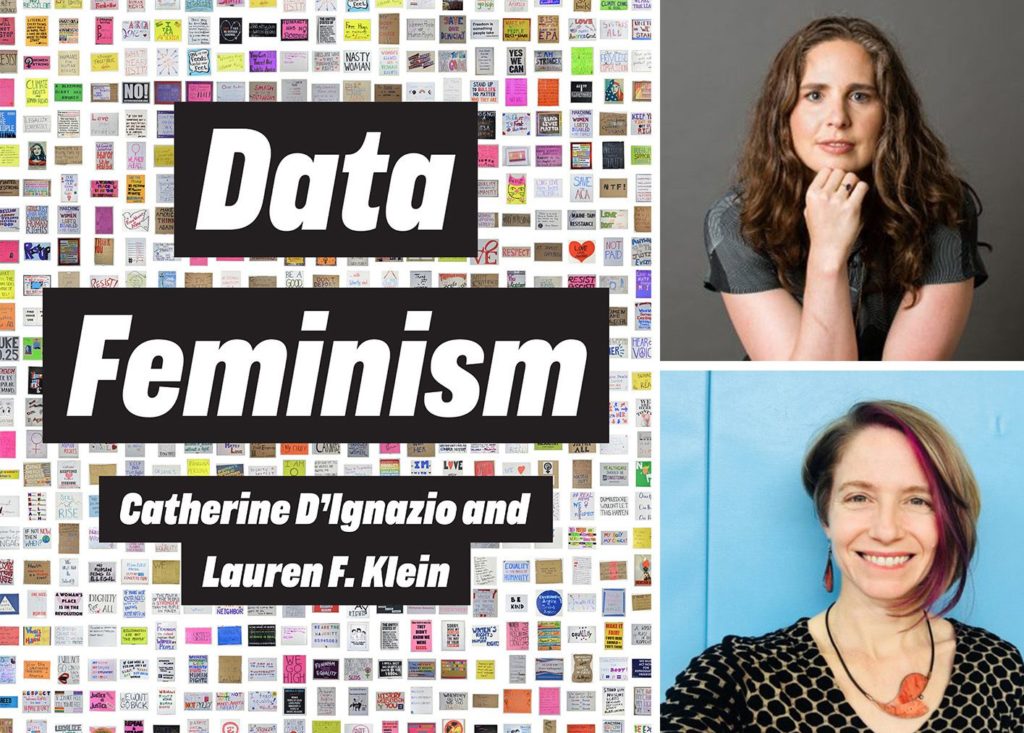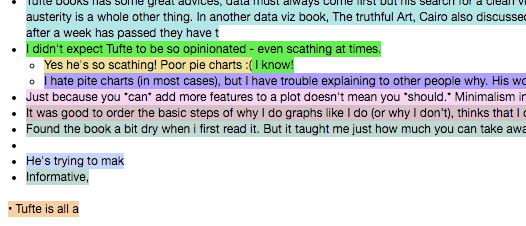Read “Practical Charts” by Nick Desbarats with us!
October 14th, 2024
7 min
This article is brought to you by Datawrapper, a data visualization tool for creating charts, maps, and tables. Learn more.
“Data Feminism is about power – about who has it and who does not.”

Do you keep getting recommendations for data vis books, maybe even buy them, but don’t make it a priority to read them? Let’s read these books together – and let’s discuss them, to get more out of them. That’s what the Data Vis Book Club is about. Join us! Here’s what we’ll read next.
After the great joy of dicussing Andy Kirk’s “Data Visualisation – A Handbook for Data Driven Design” in May, we’ll read what’s one of the most exciting books about data that came out this year: “Data Feminism” by Catherine D’Ignazio and Lauren F. Klein. We’ll read the whole book, but if you just find the time to read one chapter, make it chapter 3.
We will discuss Data Feminism on Tuesday, 1st of September at 5pm UTC here: notes.datawrapper.de/p/bookclub-datafeminism
That’s 10am on the US west coast, 1pm on the US east coast, Colombia & Peru, 2pm in Argentina, 6pm for readers in the UK & Portugal, 7pm for most other Europeans and 10.30pm in India.
Catherine and Lauren will take part in the conversation as well, joining around 45min into the discussion and answering all our questions.
Like always, everyone is welcomed to join! Just open the notepad at the correct date and time and start typing. Many participants will be new to the conversation – we’ll figure it out as we go.
Catherine D’Ignazio (@kanarinka/kanarinka.com) is an Assistant Professor at the MIT who I met first at the Responsible Data Visualization forum at the beginning of January 2016. In anticipation of this event, she wrote a blog post called “What would feminist data visualization look like?” Around the same time, Lauren F. Klein (@laurenfklein/fklein.com), now Associate Professor at Emory University, talked and wrote about feminist data visualization.
They joined forces quickly. “We wrote a short paper, Feminist Data Visualization for the IEEE Vis conference, then realized we can’t think about just feminist data visualization — because the visualization part comes at the end. You can’t make feminist data visualization if all the stuff that came earlier in the process was accomplished in some oppressive or terrible way that was reinforcing existing power structures. That’s kind of where the impetus for Data Feminism came about,” Catherine told Jason Forrest in an interview for Nightingale.

A book and its authors. Top: Lauren F. Klein, bottom: Catherine D’Ignazio.
So even if you’re far more interested in the visualization aspect than the data aspect of data vis, don’t write Data Feminism off. I asked Lauren why data vis fans should read their book. Here’s what she told me:
Feminism opens up the data visualization toolbox and allows us to focus on what truly matters in a design process: honoring context, architecting attention, and taking action to defy stereotypes and reimagine the world.
Lauren Klein
If you’re looking for practical data vis advice, this book isn’t for you. If, however, you want to reflect on the work you do, see where it fits in the greater context and learn how to think & talk about data more deeply, do read Data Feminism and discuss it with us.
And while Catherine’s and Lauren’s book explains more serious issues than the books we normally read in this book club, it’s “a surprisingly light book, one told with generosity and humor,” Jason states in the mentioned interview.
Sounds good to you? Read the book with us!
1. You get the Data Feminism book. Ask your local library to order it for you, buy it, borrow it from a friend, ask around on your preferred social network. Lauren and Catherine were so kind to provide the intro, chapter 1, chapter 2 and chapter 3 (out of 7 chapters) as PDFs for a reading club they were organizing. There’s also a draft of the whole book online. You can find the whole book online here!
2. We all read the book. That’s where the fun begins! Please mention @datavisclub or use the hashtag #datavisclub if you want to share your process, insights, and surprises – I’ll make sure to tweet them out as @datavisclub, as motivation for us all. We’ll discuss the whole book, but focus on chapter 3, since it’s most relevant to data vis designers.
3. We get together to talk about the book. This will happen digitally on September 1st, 2020 at 5pm UTC over at notes.datawrapper.de/p/bookclub-datafeminism.
It won’t be a call or a video chat; we’ll just write down our thoughts. The discussion will be structured into three questions:
During the conversation, I’ll ask these three questions in the following order:
1 What was your general impression of the book? Would you recommend it, and if so, to whom?
2 What was most inspiring, insightful, or surprising to you while reading through the book? What did you learn that you didn’t expect to? What will you remember?
3 What will you take away? Having read the book, what will you do differently the next time you visualize data?
For each question, you can prepare a short answer, but there’s no need to. We’ll quickly get into discussion mode.
After going through the three questions within approx. 45min, Lauren and Catherine will join us to answer questions we might have about their book.
Here’s a short FAQ for you, in case you have more questions:
A digital book club is a new experience for many of us. See how our book club discussions have looked like in the past:

You can also read the review of the first book club, to learn how people found the experience.
This is what others have said about some of the last book club discussions:
Because it works well for introverts & people who prefer to stay anonymous in the discussion. Plus, the documentation of our meeting writes itself.
Do you have a lunch date? Vacation? Need to bring the kids to bed? No problem! The conversation will be archived in the notes and can still be extended over the next day(s).
I’m very, very much looking forward to working through Catherine’s and Lauren’s important book with all of you. If you have any more questions, write in the comments, at lisa@datawrapper.de or to Lisa / Datawrapper on Twitter. Also, make sure to follow @datavisclub, to stay up-to-date and get a dose of motivation from time to time.
Comments